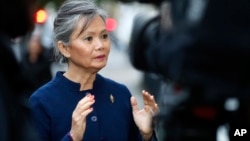Opposition leader Mu Sochua said Thai immigration officials prevented her from entering Bangkok on October 20, where she planned to meet supporters ahead of a planned return to Cambodia on November 9.
Opposition members, including exiled leader Sam Rainsy, have announced they will return to Cambodia in November. The announcement comes as Cambodia has witnessed democratic backsliding and international pressure to improve its rights situation.
Mu Sochua said on Wednesday that she flew from Kuala Lumpur, Malaysia, to Bangkok the afternoon of October 20, but was taken to a room by police officials and informed she was banned from entering the country.
“He [the police official] just spoke to me politely,” she said. “[He said that] Thailand will not allow it. They have their clear democratic principles. They completely will not do it.”
She said the officials did not provide any reason for the ban and she had to fly back to Malaysia the same day. However, Mu Sochua said it was clear that the Thai officials did not want to arrest her.
“Hun Sen wants the Thai government to arrest me and others, but Thailand will not follow Hun Sen,” said Mu Sochua.
The Thai Ambassador in Phnom Penh, Panyarak Poolthup, remained tight lipped about the incident. He said the embassy was not authorized to comment on the incident.
Cambodian Foreign Ministry spokesperson Ket Sophann and government spokesperson Phay Siphan could not be reached for comment.
Cambodian Prime Minister Hun Sen has routinely threatened to arrest CNRP activists and supporters hiding in Thailand, following a government crackdown that outlawed the opposition party and banned its senior members from politics.
Following Sam Rainsy’s August announcement of a planned return, Hun Sen said arrest warrants for opposition members had been sent to all ASEAN states, with only Laos saying it will prevent Sam Rainsy from using its territory to enter Cambodia.
Phil Robertson, deputy Asia director of Human Rights Watch, said it was unfathomable why Thai authorities would prevent Mu Sochua from entering the country or consider her a security threat.
He added that Bangkok was aware it would receive international pressure if it executed Phnom Penh’s arrest warrant for the CNRP members, and was instead looking to stay out of the political fracas.
“By refusing her entry but not arresting her, Thailand is trying to avoid getting in the middle of this dispute, and telling the Cambodians to take their political problems somewhere else,” said Phil Robertson, via email.







